As members of a profession, we are required to look more closely at the moral and ethical consequences of terminology and the promotion of tools like written journals. Considerations about conditions such as dyslexia and those with other literacy and learning difficulties are very pertinent in terms of how proposed professional tools, like written journals, can sometimes be discriminatory in themselves. Thought about visual impairments might also have an impact on whether one might see keeping written journals as an attractive option. It seems that most of those who champion the written journal have largely failed to ‘reflect’ on such issues.
There are a whole range of concerns beyond the seemingly quite obvious ponderables touched on above. The following is made up of important considerations of themes such as data-protection, human rights and confidentiality relevant to youth work practice.
The ethics of the so called ‘personal’ written journal, introduces some pertinent issues and considerations, legal and moral, relating to professional practice and record keeping.
There are a whole range of concerns beyond the seemingly quite obvious ponderables touched on above. The following is made up of important considerations of themes such as data-protection, human rights and confidentiality relevant to youth work practice.
The ethics of the so called ‘personal’ written journal, introduces some pertinent issues and considerations, legal and moral, relating to professional practice and record keeping.








